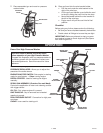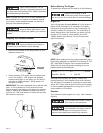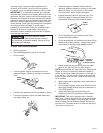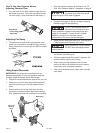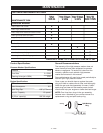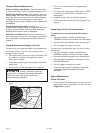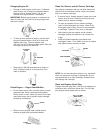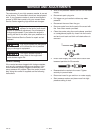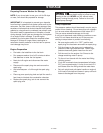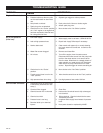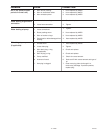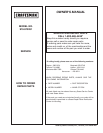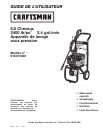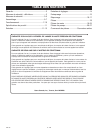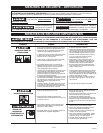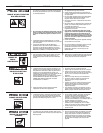
15 - ENG
D24150
STORAGE
Pump Preparation
This pressure washer should be stored in such a way to
protect it from freezing. Do not store this unit outdoors
or in an area where temperatures will fall below 32º F.
This can cause extensive damage to this unit.
If unit has to be stored under freezing conditions a non-
toxic R.V. anti-freeze should be put in the pump ac-
cording to steps below to protect from freezing.
• Be sure engine switch is in “OFF” position and
spark plug wire has been removed from spark plug.
• Pull the trigger on the spray gun to release the
pressure in the high pressure hose. Detach high
pressure hose and garden hose from the unit.
• Pull the recoil on the engine 4 to 6 times to dis-
charge remaining water in pump.
• Tip the unit on the end with the water inlet fitting
pointing upward.
• If unit will be stored where temperatures fall below
32°F, pour approximately 1/4 cup of non-toxic R.V.
anti-freeze down the fitting where the water hose
• Set unit upright and pull starter handle on engine 4
to 6 times to circulate anti-freeze in pump until anti-
freeze is discharged from the pump.
Preparing Pressure Washer for Storage
NOTE: If you do not plan to use your unit for 30 days
or more, unit should be prepared for storage.
IMPORTANT: It is important to prevent gum deposits
from forming in essential fuel system parts such as the
carburetor, fuel filter, hose or tank during storage. Also,
experience indicates that alcohol-blended fuels (called
gasohol or using ethanol or methanol) can attract mois-
ture which leads to separation and formation of acids
during storage. Acidic gas can damage the fuel system
of an engine while in storage. To avoid engine
problems, the fuel system should be emptied before
storage of 30 days or longer. Never use engine or
carburetor cleaner products in the fuel tank or perma-
nent damage may occur.
Engine Preparation
• First add a fuel stabilizer to the fuel tank.
• Run pressure washer for a full 5 minutes to allow
fuel stabilizer to enter the fuel system.
• Next shut off engine and disconnect the water
supply.
• Disconnect the spark plug wire and remove the
spark plug.
• Add one teaspoon of oil through the spark plug
hole.
• Place rag over spark plug hole and pull the recoil a
few times to lubricate the combustion chamber.
• Replace the spark plug, but do not connect the
spark plug wire.
While preparing the engine make
sure water supply is turned on and
flowing to the unit. NEVER run unit without water
supply running through pump. Failure to do so will
cause pump damage.



